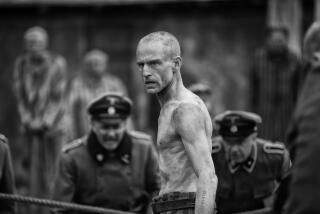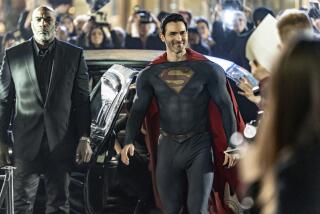Keeping the Faith in Public Television
- Share via
I’ve never watched the Daystar Television Network, but I can confidently say its programmers aren’t interested in the Joe Louis-Max Schmeling saga. Probably a little too much punching for a Christian broadcasting station.
Too bad.
The Louis-Schmeling story, which unfolded in the late 1930s in the United States and Germany, offers a terrific history lesson, not to mention a couple of great knockouts. It tells the tale of an American hero, Joe Louis. An American hero, that is, who in his heyday wouldn’t have been allowed to stay in certain hotels or eat in certain restaurants -- simply because he was black.
But Louis was lionized -- to the extent a black man could be in those days -- because he knocked out Schmeling in the first round of their 1938 heavyweight title fight. That came two years after Schmeling had surprised the boxing world by KO’ing the previously undefeated Louis in the 12th round of their first fight. By the second fight, however, Schmeling had been linked to the increasingly ominous Nazi regime in Germany, and Louis was seen as representing a free America.
As the narrator intoned: “Confronted with a choice between a white Nazi and a black American, all but the most hardened racists backed Louis.”
Americans with a few years behind them know the Louis-Schmeling story. But, I’m guessing, a lot of younger people do not.
The story, part of the “American Experience” series, airs in a 90-minute documentary that premiered last year, but which I hadn’t seen until last week on a Los Angeles-based PBS station.
And that brings us back to Daystar.
The Dallas-based televangelism station wants to buy KOCE, Orange County’s PBS station. Channel 50’s owner, the Coast Community College District, doesn’t want to sell to Daystar, but made it so obvious that a state appeals court recently ruled that the district acted improperly in not accepting Daystar’s bid. It ruled that the district’s choices were to take the station off the market or hold a new sale.
Last week in court, Daystar asked that its bid for KOCE be accepted.
The Louis-Schmeling documentary defines the bind perfectly. You may hate boxing, but the story it tells about America in the 1930s deserves an audience.
If not PBS, who would tell that story?
Where would people unfamiliar with their nation’s history learn about Harlem in the 1930s and how Louis became first a hero to black America and then to white America?
Is it enough that younger Americans just know Joe Louis as a heavyweight champ but not of the racism he and other blacks faced? Or, in the ultimate irony, that he was held up as the embodiment of a free society against a tyrant?
No way that documentary shows up on NBC. Or CBS. Or any commercial station. This is almost exclusively PBS territory.
That, no doubt, is what the district was thinking when it ignored the Daystar offer. However, as much as I share the sentiment, fair is fair. The district shouldn’t be allowed to pull a fast one on Daystar.
Perhaps we can’t have enough Christian-broadcast stations on the air. And, especially on this Sunday morning, I come not to bury Daystar but to praise PBS.
Yes, other PBS stations exist in the Southern California market. The “American Experience” series has other homes -- at least, for now.
But I must lament this moment in history -- when a public broadcast station that’s in business to tell us about our collective selves disappears under the weight of a deep-pocketed televangelist with a single story to tell.
Like Louis in the first Schmeling fight, the college district got knocked out.
But if we start losing public broadcasting stations, we may someday ask what Joe Louis must have asked in 1936:
“What hit me?”
More to Read
Go beyond the scoreboard
Get the latest on L.A.'s teams in the daily Sports Report newsletter.
You may occasionally receive promotional content from the Los Angeles Times.










